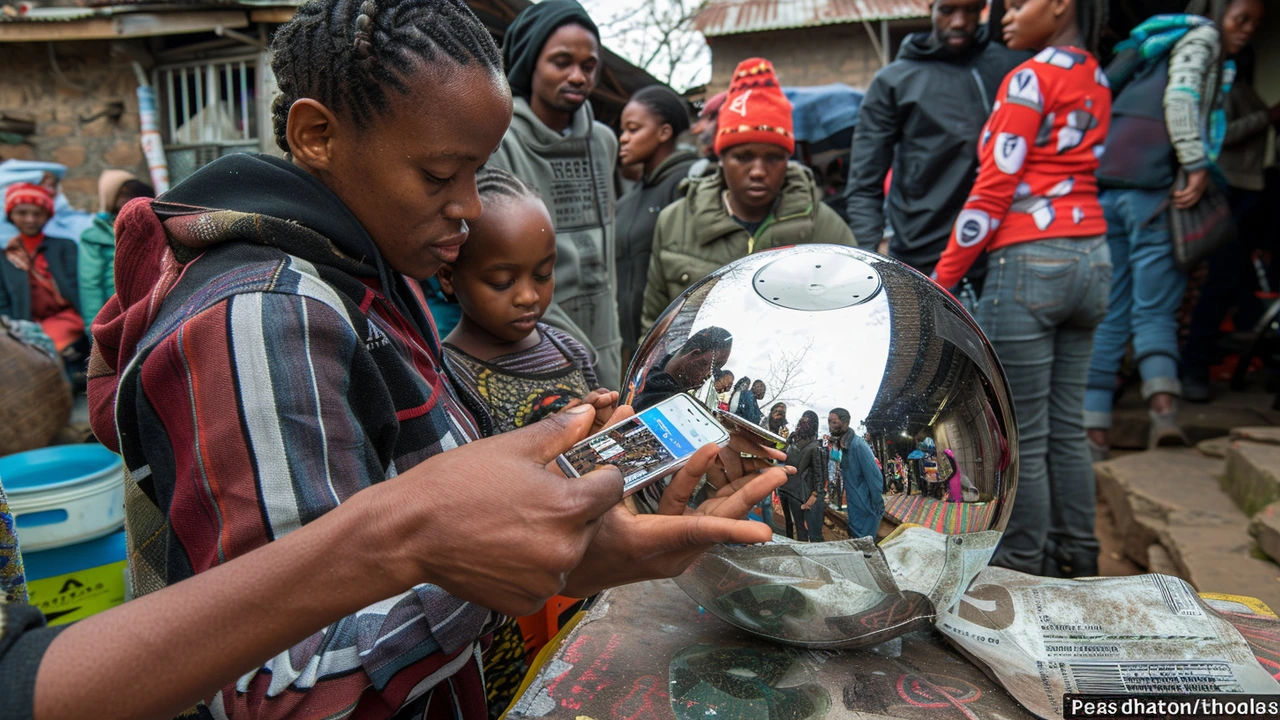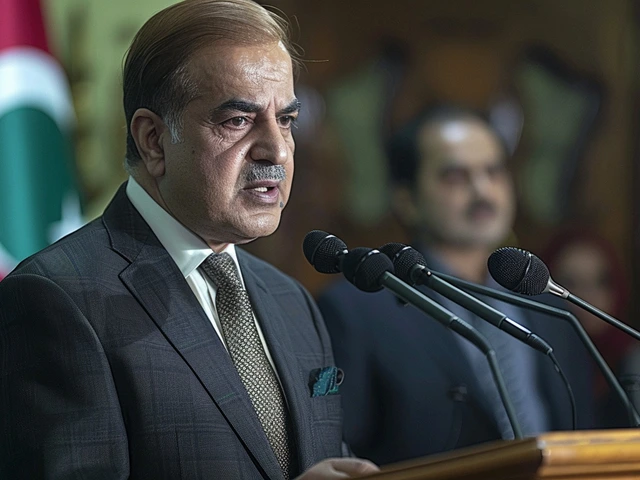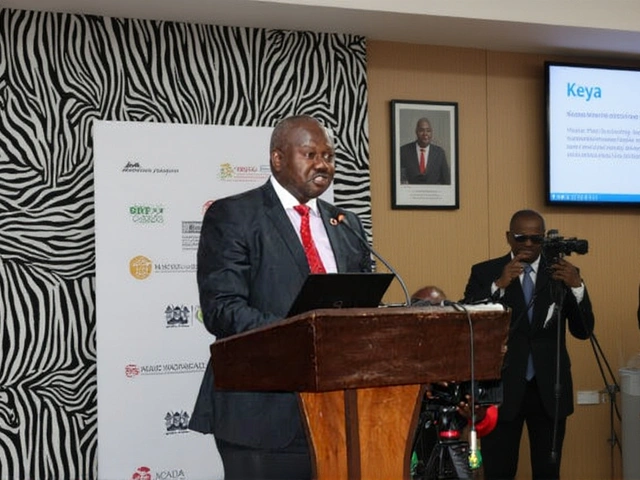Worldcoin Makes a Comeback in Kenya
Worldcoin, a cryptocurrency project initiated by Tools for Humanity and co-founded by Sam Altman, the CEO of OpenAI, is set to resume its user registration activities in Kenya. This development follows a directive from the Office of the Director of Public Prosecutions (ODPP) instructing the Directorate of Criminal Investigations (DCI) to halt an investigation into the company’s data collection practices. The investigation, which began in August of the previous year, was a response to concerns regarding the alleged illegal collection and transfer of users' personal data.
The Background of the Investigation
The probe into Worldcoin's activities was triggered by Kenya's decision to suspend the firm’s operations over concerns of data privacy. During its initial run, Worldcoin asked users to provide iris scans, a highly sensitive biometric identifier, in exchange for digital identification and free cryptocurrency tokens. This approach raised alarm among various regulatory bodies in Kenya, pushing the Capital Markets Authority to issue warnings about potential fraudulent schemes. The Office of the Data Protection Commissioner (ODPC) also called for caution regarding the new technology and its implications on personal data safety.
The Role of Authorities in the Resolution
With the investigation spanning several months, the DCI conducted a comprehensive and impartial inquiry into the matter. Their findings were subsequently submitted to the ODPP for further examination. After a detailed review of the investigative reports, the Director of Public Prosecutions concurred with the DCI’s conclusions, determining that there was no substantial evidence to support the allegations of illegal data collection and processing by Worldcoin. Consequently, the ODPP ordered the closure of the investigation file, thereby allowing Worldcoin to resume its operations in Kenya.

The Global Implications and Reactions
This resolution is particularly noteworthy given the earlier remarks by Kenya's Interior Cabinet Secretary, Kithure Kindiki, who in March indicated that the suspension of Worldcoin's activities might remain in place due to external pressures, particularly from the US government. The decision to drop the investigation signifies a shift in stance, reflecting both the thoroughness of the investigation and the growing acceptance of cryptocurrency technologies under regulated settings. Thomas Scott, the Chief Legal Officer of Worldcoin, expressed his gratitude for what he described as a fair and objective investigation, appreciating the ODPP’s decision to close the matter.
The Technology Behind Worldcoin
The Worldcoin project aims to blend cryptocurrency with unique biometric identification, a concept that has sparked both interest and controversy. The iris scan technology, which serves as a gateway for digital identification, remains a cornerstone of the project. By ensuring that each user is uniquely identified, Worldcoin seeks to prevent fraud and enhance security within its ecosystem. However, the use of such sensitive biometric data has also attracted scrutiny from privacy advocates and regulators, leading to debates on the ethical implications of the technology.

The Road Ahead for Cryptocurrency in Kenya
The successful conclusion of the investigation and the resumption of Worldcoin’s operations may pave the way for broader acceptance of digital currencies in Kenya. The presence of a regulatory framework and vigilant oversight by authorities can instill confidence among users and stakeholders. It also underscores the importance of balancing innovation with stringent data protection measures to ensure the safety and privacy of users.
For the broader cryptocurrency market, this development could serve as a benchmark for how issues related to data privacy and regulatory compliance can be navigated effectively. As more countries grapple with the challenges and opportunities presented by digital currencies, the resolution of the Worldcoin case in Kenya might offer valuable lessons on managing the intersection of technology, privacy, and regulation.
Conclusion
Worldcoin’s return to the Kenyan market, backed by the clearance from the ODPP, marks a significant milestone for the firm and the cryptocurrency sector at large. While the journey has been fraught with challenges, the outcome highlights the importance of regulatory oversight in fostering a trustworthy and secure environment for technological advancements. As Worldcoin resumes its activities, its experiences in Kenya will likely influence its strategies and operations in other markets, contributing to the ongoing evolution of the global cryptocurrency landscape.










Prakashchander Bhatt
June 21, 2024 AT 19:57Looks like Kenya is finally giving the green light to Worldcoin. This could open doors for many people who have been waiting for a reliable digital identity and a chance to earn crypto.
Mala Strahle
June 21, 2024 AT 22:44The decision to let Worldcoin back in Kenya is more than just a regulatory footnote; it is a signal that the balance between innovation and privacy is being actively negotiated. When a government steps back after a thorough investigation, it tells innovators that due process can work in their favor. It also reminds citizens that the stakes are high when biometric data meets decentralized finance. The iris scan, while technically impressive, raises philosophical questions about what it means to own a piece of your own identity. If a digital token can be tied to a unique biological marker, we may be inching toward a new kind of social contract. This contract, however, must be written with transparency and respect for human dignity. Kenya’s regulators appear to be trying to draft that contract, weighing the benefits of financial inclusion against the risks of data misuse. The involvement of high‑profile figures like Sam Altman only adds to the global spotlight on this experiment. For many Africans, access to a globally recognized digital identity could unlock services previously out of reach. Yet, the specter of data colonialism looms whenever foreign tech giants harvest biometric data. The closure of the investigation suggests that, at least for now, the evidence didn’t meet the threshold for criminal wrongdoing. That outcome may embolden other startups to seek similar pathways in emerging markets. At the same time, it should encourage watchdogs to refine their frameworks so future cases are assessed even more rigorously. In the grand scheme, this episode could become a case study on how to align cutting‑edge tech with local laws. Ultimately, the hope is that a collaborative approach will emerge, where innovators, regulators, and citizens co‑create standards that protect privacy while fostering growth.
shubham garg
June 22, 2024 AT 01:30Wow, that’s a big win for the crypto community here! It’s cool to see the authorities actually dig into the facts and not just shut things down. If they keep the process transparent, more people will trust the whole thing. Let’s hope the rollout stays smooth and the data stays safe.
LEO MOTTA ESCRITOR
June 22, 2024 AT 04:17Honestly, this feels like a fresh start for both Worldcoin and Kenyan users. The whole thing shows that a calm, methodical review can bring clarity. If the project keeps listening to local concerns, it could really help broaden financial inclusion. Fingers crossed the next phase runs without hitches.
Sonia Singh
June 22, 2024 AT 07:04Great to see progress, let’s keep the conversation respectful.
Ashutosh Bilange
June 22, 2024 AT 09:50So the drama finally chills out – Worldcoin’s back and the police said “nah, we’re good”. People were hype fearing a massive data heist, but it turns out the paperwork just wasn’t solid enough for a case. Hopefully the team learns from this and upgrades their security, because trust is everything in crypto. If they keep spilling the tea on how they protect iris data, maybe we’ll all sleep better at night. Otherwise, it’s just another headline that fades fast.